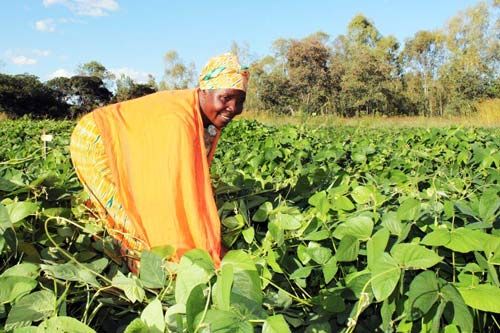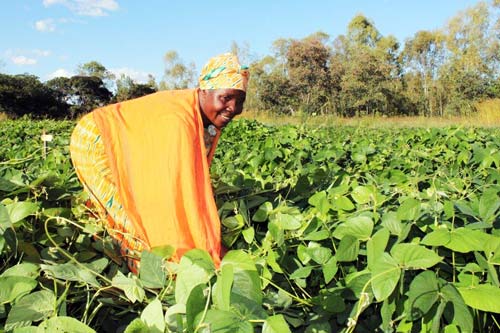
SIMLESA to Share Lessons Learned, Experience Gained

By Johnson Siamachira
CIMMYT’s Sustainable Intensification of Maize‒Legume Cropping Systems for Food Security in Eastern and Southern Africa (SIMLESA) project held two workshops to extract, document and package key messages and lessons learned, as well as experiences gained from the first phase of the SIMLESA (2010‒2014). Using appropriate channels, these will be disseminated to wider audiences and partners under the guidance of CIMMYT’s Communication Team.
The first meeting was held in Melkassa, Ethiopia, from December 15‒17, 2014, while the second was held in Lilongwe, Malawi during January 19‒25, 2015. Similar meetings were planned for Kenya and Tanzania teams during the first quarter of 2015.
Dr. Paswel Marenya, SIMLESA socioeconomics (Objective One) Team Leader, told the two meetings that one of the major challenges for researchers everywhere is to make themselves heard clearly, and by many different publics. “If a tree fell in the forest and no one is there to hear it, did it make a sound?” He posed.
“If we produce interesting research from our work but fail to document and communicate these to the wider community, we lose a great opportunity to be heard and we may also lose the opportunity to make an impact,” he added. In fact, many development practitioners contend that inadequate documentation skills in many organizations made it difficult for them to gather success stories, case studies and information beneficial for informing policy action and technical guidelines for extension staff, among other communication products.
The three-day meeting in Ethiopia was attended by 23 participants from the Ethiopian Institute of Agricultural Research (EIAR) and CIMMYT. Selected participants from EIAR presented summarized information on achievements of SIMLESA Phase I.
Keynote presentations focused on farm household typologies, economic return analysis of conservation-agriculture-based practices and adoption monitoring. Participants recommended that SIMLESA advice on the production of appropriate information and communication products, based on the information presented.
The five-day Malawi meeting was attended by 25 people from the country’s Ministry of Agriculture, and the National Association of Smallholder Farmers of Malawi. The meeting agreed to focus on pulling together the output from SIMLESA Phase I around the following themes:
- Success stories, markets and value chains (the consolidation in the markets and value chains work could focus on developing maize‒legume value chain factsheets);
- Adoption monitoring (possible products are factsheets and policy briefs);
- Agronomic and economic impacts of conservation agriculture;
- Innovation platforms (videos, radio programs and feature articles); and,
- Gap analysis in SIMLESA.
To complement the discussions, the participants took a one-day field trip to Salima District.
Mr. Donald Siyeni, SIMLESA‒Malawi Conservation Agriculture (Objective11) representative, said of the meeting: “The meeting has helped the Malawi team to focus on the project’s achievements and to shape future activities.’’
Now in its second phase (2014-2018) SIMLESA implements a number of development initiatives in Ethiopia, Kenya, Malawi, Mozambique and Tanzania. These initiatives are expected to produce lessons that will inform future long-term agricultural interventions in sub-Saharan Africa. Stakeholders are supposed to generate communication products with the assistance of SIMLESA field staff. These lessons are part of CIMMYT’s responsibility to produce public goods in the form of “knowledge products” that can be used to guide agricultural development in maize-based systems around the developing world.